Ditapis dengan
E-book A Samaritan State Revisited : Historical Perspectives on Canadian Fore…
Over the past two decades, Canadian international history has slipped its traditional North Atlantic moorings. Studies of Canada’s postwar relation-ships with a waning United Kingdom or an ascendant United States have faded in popularity, replaced with a stream of publications on relations with the decolonized states of Asia, Africa, and the Caribbean, countries whose citizens increasingly co…
- Edisi
- -
- ISBN/ISSN
- 9781773850405
- Deskripsi Fisik
- 393 hlm
- Judul Seri
- -
- No. Panggil
- 327.111 BLA a
E-book Northeastern Asia and the Northern Rockies : Treasures from the Los An…
his exhibition, Northeastern Asia and the Northern Rockies, has been conceived as an introduction in four parts that will help visitors to the museum and scholars of the university understand key elements of both traditional and current Northeastern Asian native and migrant cultures. The first three parts of the exhibition introduce fundamen-tal concepts inherent in Daoism, Confucian…
- Edisi
- -
- ISBN/ISSN
- 9781685711177
- Deskripsi Fisik
- 325 hlm
- Judul Seri
- -
- No. Panggil
- 902 LIT n
E-book Borderblur Poetics : Intermedia and Avant-Gardism in Canada, 1963-1988
“This is the death of the poem as I have faithfully reported it, November 29, 1966, as I have faithfully reported it, this is the death of the poem” in-tones Canadian poet bpNichol one day after the Dominion Day celebrations marking Canada’s centennial year. Addressing a national television audi-ence, Nichol reads these lines with poets bill bissett an…
- Edisi
- -
- ISBN/ISSN
- 9781773854588
- Deskripsi Fisik
- 299 hlm
- Judul Seri
- -
- No. Panggil
- 909.82 SCH b
E-book The Road to General Intelligence
The rise of civilization is synonymous with the creation of tools that extend the intel-lectual and physical reach of human beings [133]. The pinnacle of such endeavours isto replicate the flexible reasoning capacity of human intelligence within a machine,making it capable of performing useful work on command, despite the complexityand adversity of the real world. In order to achieve such Artif…
- Edisi
- -
- ISBN/ISSN
- 9783031080203
- Deskripsi Fisik
- 142 hlm
- Judul Seri
- -
- No. Panggil
- 006.3 SWA t
E-book Functional Somatic Symptoms in Children and Adolescents : A Stress-Sys…
Every day in hospitals, doctors’ surgeries, and school sick bays around the world, children (including adolescents) present with what have come to be known as functional somatic symptoms. These symptoms are ones that cannot be explained by an identifiable disease process—even after an extensive medical assessment has been done. They reflect, instead, …
- Edisi
- -
- ISBN/ISSN
- 9783030461843
- Deskripsi Fisik
- 397 hlm
- Judul Seri
- -
- No. Panggil
- 616.8917 KOZ f
E-book Euthanasia : Searching for the Full Story Experiences and Insights of …
For more than 20 years I have practiced nursing, first in oncology services, then in palliative care. As a teacher and psychotherapist for the past 10 years, I have had the opportunity to continue working with nursing students in palliative care and psychi-atric services, as well as to supervise nursing teams. An ethicist by training, I belong to an ethics committee in a neuropsychiatric hospit…
- Edisi
- -
- ISBN/ISSN
- 9783030567958
- Deskripsi Fisik
- 122 hlm
- Judul Seri
- -
- No. Panggil
- 618.976 VER e
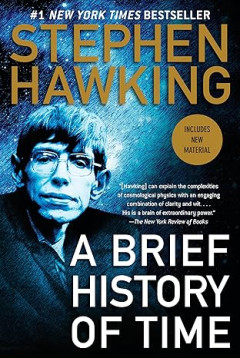
E-book A Brief History of Time
A landmark volume in science writing by one of the great minds of our time, Stephen Hawking’s book explores such profound questions as: How did the universe begin—and what made its start possible? Does time always flow forward? Is the universe unending—or are there boundaries? Are there other dimensions in space? What will happen when it all ends? Told in language we all can understand…
- Edisi
- -
- ISBN/ISSN
- 9780553896923
- Deskripsi Fisik
- 185 halaman
- Judul Seri
- -
- No. Panggil
- 523.1 HAW a

E-book Objectivity: A Very Short Introduction
Is objectivity possible? Can there be objectivity in matters of morals? What would a truly objective account of the world be like? Is everything subjective, or relative? Are moral judgments objective or culturally relative? This Very Short Introduction demonstrates that there are a number of common misunderstandings about what objectivity is, and explores the theoretical and practical problems …
- Edisi
- -
- ISBN/ISSN
- 9780199606696
- Deskripsi Fisik
- 258 halaman
- Judul Seri
- -
- No. Panggil
- 153.4 GAU o
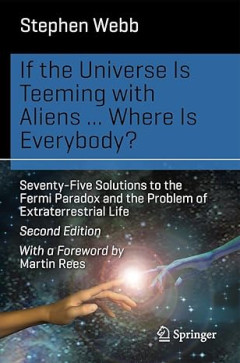
E-book If the Universe Is Teeming with Aliens ... WHERE IS EVERYBODY?: Sevent…
Given the fact that there are perhaps 400 billion stars in our Galaxy alone, and perhaps 400 billion galaxies in the Universe, it stands to reason that somewhere out there, in the 14-billion-year-old cosmos, there is or once was a civilization at least as advanced as our own. The sheer enormity of the numbers almost demands that we accept the truth of this hypothesis. Why, then, have we encount…
- Edisi
- -
- ISBN/ISSN
- 9783319132358
- Deskripsi Fisik
- 442 halaman, ilus.
- Judul Seri
- -
- No. Panggil
- 001.9 WEB i
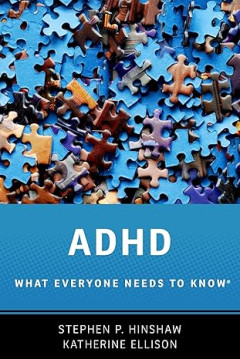
E-book ADHD: What Everyone Needs to Know®
Rates of diagnosis of attention-deficit/hyperactivity disorder (ADHD) are skyrocketing, throughout America and the rest of the world. U.S. rates of youth diagnosis have increased 40% from just a decade ago. Adults with ADHD are now the fastest-growing segment of the population receiving diagnosis and medication. The disorder is painful and sometimes disabling for individuals and tremendously co…
- Edisi
- -
- ISBN/ISSN
- 9780190223793
- Deskripsi Fisik
- 217 halaman
- Judul Seri
- -
- No. Panggil
- 616.89 HIN a
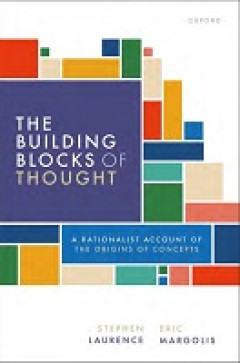
E-book The Building Blocks of Thought: A Rationalist Account of the Origins o…
The human mind is capable of entertaining an astounding range of thoughts. These thoughts are composed of concepts or ideas, which are the building blocks of thoughts. This book is about where all of these concepts come from and the psychological structures that ultimately account for their acquisition. We argue that the debate over the origins of concepts, known as the rationalism-empiricism d…
- Edisi
- -
- ISBN/ISSN
- 9780192898838
- Deskripsi Fisik
- 692 halaman
- Judul Seri
- -
- No. Panggil
- 101 LAU t

E-book Anne Frank’s Tree : Nature’s Confrontation with Technology, Domina…
Trees can also be tied to the idea of domination. I have long argued that the process of ecological restoration, in which a kind of environ-mental engineering attempts the re-creation of previously degraded or destroyed natural environments, is an example of the human project to assert our technological mastery over the autonomous processes of the natural world.1 The management of forests for h…
- Edisi
- -
- ISBN/ISSN
- 9781912186365
- Deskripsi Fisik
- 214 hlm
- Judul Seri
- -
- No. Panggil
- 902 KAT a

E-book Paris in the Dark : Going to the Movies in the City of Light, 1930–1950
These listings provided the now vanished cinematic geography of prewar Paris. One could chart how movies moved through neighborhoods, the de-velopment (and closure) of cinemas, and the relative importance of movies to diferent parts of town (typically around eighteen cinemas in the periph-eral, working-class twentieth arrondissement and none in the firs…
- Edisi
- -
- ISBN/ISSN
- 9781478006923
- Deskripsi Fisik
- 225 hlm
- Judul Seri
- -
- No. Panggil
- 778.53 SMO p

E-book Oral History at a Distance
Oral History at a Distance is the first publication to explore both the ideas behind and application of oral history in remote projects. Since the COVID-19 pandemic, working from a distance is now an ongoing and necessary approach in the oral historian’s toolkit. In this volume, the experienced team members of Baylor University’s Institute for Oral History provide a road map for adapting tr…
- Edisi
- -
- ISBN/ISSN
- 9781040102848
- Deskripsi Fisik
- 249 halaman
- Judul Seri
- -
- No. Panggil
- 302.224 SIE o

E-book Eyewitness Travel: Pacific Northwest
This newly updated guide covers all the major cities, from Portland, Oregon, to Seattle, Washington, to Vancouver, British Columbia, and provides all the insider tips you need, whether you want to kayak on Lake Ozette in Olympic National Park or go shopping in downtown Seattle's Columbia Center. Explore the culture, history, architecture, beaches, and scenic walks area-by-area.
- Edisi
- -
- ISBN/ISSN
- 9781465457127
- Deskripsi Fisik
- 346 halaman, ilus.
- Judul Seri
- -
- No. Panggil
- 910 BRE e

E-book Languages: A Very Short Introduction
How many languages are there? What differentiates one language from another? Are new languages still being discovered? Why are so many languages disappearing? The diversity of languages today is varied, but it is steadily declining. In this Very Short Introduction, Stephen Anderson answers the above questions by looking at the science behind languages. Considering a wide range of different l…
- Edisi
- -
- ISBN/ISSN
- 9780199590599
- Deskripsi Fisik
- 313 halaman
- Judul Seri
- -
- No. Panggil
- 400.0 AND l
E-book Eyewitness Travel: Vienna
teeped in imperial splendour, Vienna delights at every turn. From Roman ruins at the foot of the Hofburg to the tallest tower of Gothic Stephansdom, the city's landmarks are a testament to its rich history. And no list of Vienna's treasures would be complete without its engaging museums and world-famous classical music.
- Edisi
- -
- ISBN/ISSN
- 9780241306178
- Deskripsi Fisik
- 290 halaman, ilus.
- Judul Seri
- -
- No. Panggil
- 910 BRO e

E-book Eyewitness Travel: Top 10 Tokyo
True to its name, this covers all of Tokyo's major sights and attractions in easy-to-use top 10 lists that help you plan the vacation that's right for you.
- Edisi
- -
- ISBN/ISSN
- 9781465459985
- Deskripsi Fisik
- 146 halaman, ilus.
- Judul Seri
- -
- No. Panggil
- 910 MAN e

E-book Eyewitness Travel: Tokyo
Explore the busy streets, exciting food, and historic sights of Tokyo. Learn the must-sees of this amazing capital city. Discover DK Eyewitness Travel Guide: Tokyo. • Detailed itineraries and "don't-miss" destination highlights at a glance. • Illustrated cutaway 3-D drawings of important sights. • Floor plans and guided visitor information for major museums. • Guide…
- Edisi
- -
- ISBN/ISSN
- 9781465457318
- Deskripsi Fisik
- 206 halaman, ilus.
- Judul Seri
- -
- No. Panggil
- 910 BUR e

E-book Biblical Archaeology: A Very Short Introduction
Public interest in biblical archaeology is at an all-time high, as television documentaries pull in millions of viewers to watch shows on the Exodus, the Ark of the Covenant, and the so-called Lost Tomb of Jesus. Important discoveries with relevance to the Bible are made virtually every year--during 2007 and 2008 alone researchers announced at least seven major discoveries in Israel, five of th…
- Edisi
- -
- ISBN/ISSN
- 9780195342635
- Deskripsi Fisik
- 169 halaman
- Judul Seri
- -
- No. Panggil
- 220 CLI b
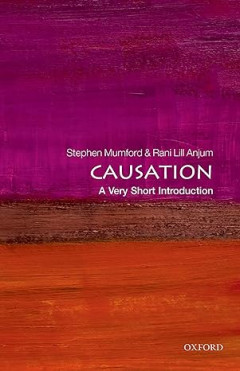
E-book Causation: A Very Short Introduction
Causation is the most fundamental connection in the universe. Without it, there would be no science or technology. There would be no moral responsibility either, as none of our thoughts would be connected with our actions and none of our actions with any consequences. Nor would we have a system of law because blame resides only in someone having caused injury or damage. Any intervention we m…
- Edisi
- -
- ISBN/ISSN
- 9780199684434
- Deskripsi Fisik
- 259 halaman
- Judul Seri
- -
- No. Panggil
- 122 MUM c
E-book Critical Theory: A Very Short Introduction
Critical theory emerged in the 1920s from the work of the Frankfurt School, the circle of German-Jewish academics who sought to diagnose—and, if at all possible, cure—the ills of society, particularly fascism and capitalism. In this book, Stephen Eric Bronner provides sketches of leading representatives of the critical tradition (such as George Lukács and Ernst Bloch, Theodor Adorno and Wa…
- Edisi
- -
- ISBN/ISSN
- 9780199730070
- Deskripsi Fisik
- 145 halaman
- Judul Seri
- -
- No. Panggil
- 301 BRO c
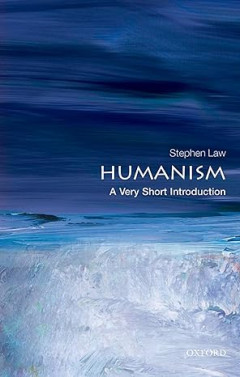
E-book Humanism: A Very Short Introduction
People of faith often argue that without God, there can be no morality. Indeed, without religion, our lives are left without meaning and are likely to degenerate into moral chaos. In this Very Short Introduction, philosopher Stephen Law explains why these claims are false and why humanism--though a rejection of religion--nevertheless provides both a moral basis and a meaning for our lives. Inde…
- Edisi
- -
- ISBN/ISSN
- 9780199553648
- Deskripsi Fisik
- 319 halaman
- Judul Seri
- -
- No. Panggil
- 144 LAW h
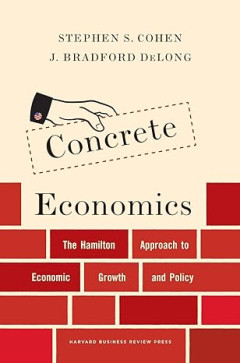
E-book Concrete Economics: The Hamilton Approach to Economic Growth and Policy
History, not ideology, holds the key to growth. Brilliantly written and argued, Concrete Economics shows how government has repeatedly reshaped the American economy ever since Alexander Hamilton’s first, foundational redesign. This book does not rehash the sturdy and long-accepted arguments that to thrive, entrepreneurial economies need a broad range of freedoms. Instead, Steve Cohen an…
- Edisi
- -
- ISBN/ISSN
- 9781422189825
- Deskripsi Fisik
- 240 halaman
- Judul Seri
- -
- No. Panggil
- 330.973 COH c
E-book Japanese Warrior Monks ad 949 - 1603
Buddhism is popularly regarded in the West as being a very peaceful religion, but this way by no means the image presented by the famous warrior monks of medieval Japan. From the 10th century onwards the great monastic foundations of Nara and Mount Hiei maintained private armies that terrified the courtiers and citizens of the capital with their religious and military power. Armed with long nag…
- Edisi
- -
- ISBN/ISSN
- 1841765732
- Deskripsi Fisik
- 68 hlm
- Judul Seri
- -
- No. Panggil
- 206.5752 TUR j
E-book Russian Energy Strategy in the Asia-Pacific : Implications for Australia
Given Australia’s lack of energy security strategy, it is not surprising that the country is void of institutional knowledge and know-how of Russian foreign energy strategy. The ‘lucky country’ as it were, relies entirely on sea lines of communication to the north to supply fuel and to export Australian coal and natural gas. Australia has entered the 2020s as the world’s largest liquefi…
- Edisi
- -
- ISBN/ISSN
- 9781760463397
- Deskripsi Fisik
- 241 hlm
- Judul Seri
- -
- No. Panggil
- 320.12 BUC r
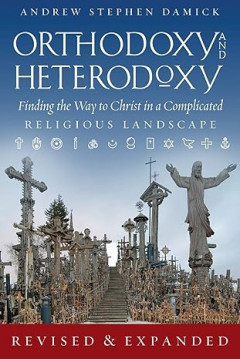
E-book Orthodoxy and Heterodoxy: Finding the Way to Christ in a Complicated R…
This new edition of the bestselling Orthodoxy & Heterodoxy is fully revised and significantly expanded. Major new features include a full chapter on Pentecostalism and the Charismatic movements, an expanded epilogue, and a new appendix ( How and Why I Became an Orthodox Christian ). More detail and more religions and movements have been included, and the book is now addressed broadly to both Or…
- Edisi
- -
- ISBN/ISSN
- 9781944967178
- Deskripsi Fisik
- 494 halaman
- Judul Seri
- -
- No. Panggil
- 230 DAM o
E-book London’s Waterfront and its World, 1666–1800
This volume, covering the period 1666–1800, considers the archaeology of the port of London on a wide scale, from the City down the Thames to Deptford. During this period, with the waterfront at its centre, London became the hub of the new British empire, contributing to the exploitation of people from other lands known as slavery.
- Edisi
- -
- ISBN/ISSN
- 9781803276557
- Deskripsi Fisik
- 302 halaman
- Judul Seri
- -
- No. Panggil
- 930.1 SCH l
E-book Encyclopedia of Management Theory
The word manage, according to the Oxford English Dictionary, is derivative of the Latin manus, or hand and emerges from the Italian maneggiare, which refers to the handling or training of horses. Its use has since been expanded to represent a broader concern for the proper handling of things or people, particularly with regard to a company or organization. This is true across multiple levels of…
- Edisi
- -
- ISBN/ISSN
- -
- Deskripsi Fisik
- 1053 hlm
- Judul Seri
- -
- No. Panggil
- 658.003 ABR e

Marvel Encyclopedia, New Edition
Marvel Encyclopedia features: - Authoritative, Marvel-approved text for more than 1,200 Marvel characters. - Most comprehensive reference guide to Marvel Comics characters on the market, from iconic heroes and villains to a multitude of lesser-known, supporting characters - Lavishly illustrated format will appeal to both Marvel Comics aficionados and more casual fans - A to Z and ranked p…
- Edisi
- -
- ISBN/ISSN
- 9781465478900
- Deskripsi Fisik
- 450 halaman, ilus.
- Judul Seri
- -
- No. Panggil
- 701 WIA m
E-book Eyewitness Travel: Brittany
- Edisi
- -
- ISBN/ISSN
- 9781465459930
- Deskripsi Fisik
- 290 halaman, ilus.
- Judul Seri
- -
- No. Panggil
- 910 CHA e
- Edisi
- -
- ISBN/ISSN
- 9781465459930
- Deskripsi Fisik
- 290 halaman, ilus.
- Judul Seri
- -
- No. Panggil
- 910 CHA e

E-Book Icelandic Folklore and the Cultural Memory of Religious Change
This book attempts to understand the origins and development of religious belief in Iceland and greater Scandinavia through the lenses of five carefully selected Icelandic folktales collected in Iceland during the nineteenth century. Each of these five stories has a story of its own: a historical and cultural context, a literary legacy, influences from beliefs of all kinds (orthodox and heterod…
- Edisi
- -
- ISBN/ISSN
- 9781641893756
- Deskripsi Fisik
- 171 halaman, ilus.
- Judul Seri
- -
- No. Panggil
- 270 BRY i
E-book Encyclopedia of Communication Theory
Sociolinguistic research in the 1950s and 1960s had shown how people change the degree of formality of their language as a function of the social contexts in which they find themselves. This was explained in terms of social norms dictating language use. In other words, we should speak very softly and respectfully here, but we can be more boisterous and casual there. Communication (or speech) ac…
- Edisi
- -
- ISBN/ISSN
- 9781412959377
- Deskripsi Fisik
- 1174 hlm
- Judul Seri
- -
- No. Panggil
- 380.03 LIT e
E-book The Long Trajectory : Reincarnation and Life After Death
I would like to begin by saying a few things about the origin and purpose of this book. These chapters began as a series of lectures organized and sponsored by the Esalen Center for Theory and Research, founded by independent scholar Michael Murphy, author of The Future of the Body. Mike likes to convene groups of passionate and competent scholars to discuss issues and themes that are not being…
- Edisi
- -
- ISBN/ISSN
- 9781462069644
- Deskripsi Fisik
- 275 hlm
- Judul Seri
- -
- No. Panggil
- 129 WEI t
E-book The Universe in a Nutshell
By the century's end, discrepancies in the idea of an all-pervading ether began to appear. It was expected that light would travel at a fixed speed through the ether but that if you were traveling through the ether in the same direction as the light, its speed would appear lower, and if you were traveling in the opposite direction of the light, its speed would appear higher. Yet a series of exp…
- Edisi
- -
- ISBN/ISSN
- 0593048156
- Deskripsi Fisik
- 219 hlm
- Judul Seri
- -
- No. Panggil
- 530.12 HAW t
E-book Samurai Warfare
The Ancestors of the Samurai The word 'samurai', which is commonly used for all varieties of ancient Japanese warrior, actually signifies the military elite of old Japan, a knightly caste who commanded armies, and also led their followers into battle. Their military and political skills eventually enabled them to control civilian governments, developing, through almost constant civil warfare, a…
- Edisi
- -
- ISBN/ISSN
- 1854092804
- Deskripsi Fisik
- 157 hlm
- Judul Seri
- -
- No. Panggil
- 739.7 TUR s
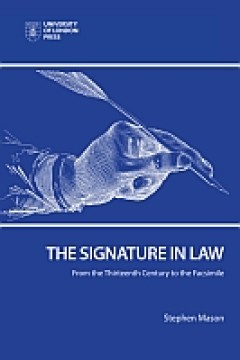
E-Book The Signature in Law: From the Thirteenth Century to the Facsimile
This book explores the judicial development of the concept of the signature from the thirteenth century to the age of the facsimile transmission. It puts the concept of the signature into a broad legal context to set out the purposes that can be attributed to a signature, and to explain the functions a signature is capable of performing. Drawing on cases from common law jurisdictions across the…
- Edisi
- -
- ISBN/ISSN
- 9781911507321
- Deskripsi Fisik
- 122 halaman
- Judul Seri
- -
- No. Panggil
- 342 MAS t

E-Book Cultivating Compassion: Going Beyond Crises
The massive disruptions caused by climate change, the Covid-19 Pandemic, war, and ever-rising inequalities have presented the world with challenges across social and economic life, health and education, policy, politics, and community life. Compassion is a central Buddhist value and practice but is also essential to our survival. Defined as feeling genuine concern about the suffering of others …
- Edisi
- -
- ISBN/ISSN
- 9781803741949
- Deskripsi Fisik
- 9783631868102
- Judul Seri
- -
- No. Panggil
- 181.043 SHI c
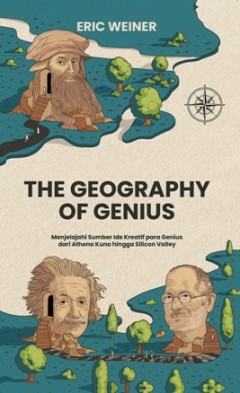
The Geography of Genius: Menjelajahi Sumber Ide Kreatif para Genius dari Athe…
Mengapa Edinburgh dapat melahirkan sekumpulan genius kreatif, Florence melahirkan Leonardo da Vinci, dan Silicon Valley melahirkan Steve Jobs? Apakah karena iklimnya, toleransi masyarakatnya, sumber daya melimpah, atau hanya keberuntungan belaka? Lalu, apakah formula genius juga berlaku di tempat lain? Para genius tidak lahir di sembarang waktu dan tempat. Leonardo da Vinci tak akan melahirkan…
- Edisi
- Ed. 2 Cet. 2
- ISBN/ISSN
- 9786024412616
- Deskripsi Fisik
- 488 hlm; 13 x 20,5 cm
- Judul Seri
- -
- No. Panggil
- 910 WEI t

The Geography of Bliss: Kisah Sang Pelancong Filosofis yang Berkeliling Dunia…
Apakah orang Swiss lebih bahagia karena negara mereka paling demokratis di dunia? Apakah penduduk Qatar, yang bergelimang dolar dari minyak, menemukan kebahagiaan di tengah semua kekayaan itu? Apakah Raja Bhutan seorang pengkhayal karena memakai indikator kebahagiaan rakyat yang disebut Gross National Happiness sebagai prioritas nasional? Mengapa penduduk Asheville, Carolina Utara, sangat bahag…
- Edisi
- Ed. 5 Cet. 2
- ISBN/ISSN
- 9786024412982
- Deskripsi Fisik
- 524 hlm; 13 x 20,5 cm
- Judul Seri
- -
- No. Panggil
- 910.92 WEI t
E-book Everything Flows : Towards a Processual Philosophy of Biology
his book is a venture in the metaphysics of science, the exploration of the most basicfeatures of the world implied or presupposed by science. One of its main aims is todemonstrate the fundamental importance of such an investigation. Getting this verygeneral picture right makes a real difference to whether we do the science well andunderstand properly what it tells us. The particular metaphysic…
- Edisi
- -
- ISBN/ISSN
- 9780198779636
- Deskripsi Fisik
- 403 hlm
- Judul Seri
- -
- No. Panggil
- 570.1 AND e
E-book Orchids
Orchids are some of the best known and loved plants by amateurs and scientists alike, although sadly many species are being driven to extinction by either direct or indirect human activities. The preparation of a conservation Action Plan for the Orchidaceae, a family comprising some 20,000 species, therefore seemed a daunting task, but this compilation of views and experience from many experts …
- Edisi
- -
- ISBN/ISSN
- 2831703255
- Deskripsi Fisik
- 173 hlm
- Judul Seri
- -
- No. Panggil
- 584.4 HAG o
E-book Patent Landscape Reoprt on Animal Genetic Resources
This patent landscape report provides an overview of international patent activity for animal genetic resources, in particular those relating to food and agriculture. The empirical analysis of patent activity for animal genetic resources for food and agriculture has received remarkably little attention in the scientific literature. Indeed, in conducting the present research we found no example …
- Edisi
- -
- ISBN/ISSN
- -
- Deskripsi Fisik
- 178 hlm
- Judul Seri
- -
- No. Panggil
- 591.3 OLD p
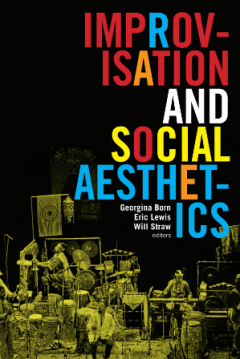
E-book Improvisation and Social Aesthetics
Addressing a wide range of improvised art and music forms—from jazz and cinema to dance and literature—this volume's contributors locate improvisation as a key site of mediation between the social and the aesthetic. As a catalyst for social experiment and political practice, improvisation aids in the creation, contestation, and codification of social realities and identities. Among other to…
- Edisi
- -
- ISBN/ISSN
- 9780822374015
- Deskripsi Fisik
- -
- Judul Seri
- -
- No. Panggil
- 781.36 BOR i
E-book Phonology in the Twentieth Century
This book is primarily concerned with the history of linguistics, but it is notsimplyaboutthe history of linguistics. For one thing, positions are taken belowon issues which (while they arise in a historical context) are discussed for theirown sake, such as the motivation for assuming a significant level of phoneticrepresentation in linguistics. Further, while the text traces the development of…
- Edisi
- -
- ISBN/ISSN
- 9783961103270
- Deskripsi Fisik
- 545 hlm
- Judul Seri
- -
- No. Panggil
- 414 AND p
E-book Rethinking Health Care Ethics
The audience for this book is anyone who has experienced a discrepancy between their own individual thinking about ethics—whether in med-icine, nursing, social work, psychology, or other fields—and what they encounter in the academically oriented, comparatively theoretical dis-cussions of ethics as presented in grand rounds, at conferences, and in profes…
- Edisi
- -
- ISBN/ISSN
- 9789811308307
- Deskripsi Fisik
- 177 hlm
- Judul Seri
- -
- No. Panggil
- 171.7 SCH r
E-book Mathematics for Computer Science
This text explains how to use mathematical models and methods to analyze problems that arise in computer science. Proofs play a central role in this work because the authors share a belief with most mathematicians that proofs are essential for genuine understanding. Proofs also play a growing role in computer science; they are used to certify that software and hardware will always behave correc…
- Edisi
- -
- ISBN/ISSN
- -
- Deskripsi Fisik
- 1048 hlm
- Judul Seri
- -
- No. Panggil
- 004.0151 LEH m
E-book Your Money or Your Life : The Tyranny of Global Finance
The tendency towards concentration in the corporate sector has been given a huge boost as we approach the twenty-first century. There were more mega-mergers in 1998 than in any previous year - in banking, insurance, oil, chemicals, pharmaceuticals, automobiles and the media. This merger frenzy has amplified the power of a handful of companies over whole sectors of the global economy. The merger…
- Edisi
- -
- ISBN/ISSN
- 074531420
- Deskripsi Fisik
- 349 hlm
- Judul Seri
- -
- No. Panggil
- 336.3 TOU y
E-book The Life of Breath in Literature, Culture and Medicine Classical to C…
This open access book studies breath and breathing in literature and culture and provides crucial insights into the history of medicine, health and the emotions, the foundations of beliefs concerning body, spirit and world, the connections between breath and creativity and the phenomenology of breath and breathlessness. Contributions span the classical, medieval, early modern, Romantic, Victori…
- Edisi
- -
- ISBN/ISSN
- 2634-6443
- Deskripsi Fisik
- 558 hlm
- Judul Seri
- -
- No. Panggil
- 902 ADE t
E-book Worldwide Fuel Charter : Gasoline and Diesel Fuel
On behalf of vehicle and engine manufacturers from around the world, the Worldwide Fuel Charter (WWFC) Committee is pleased to present the Sixth Edition of the Worldwide Fuel Charter for Gasoline and Diesel Fuel, 21 years after publishing the First Edition. In addition to this Charter, the Committee recently published the First Edition of the WWFC for Methane-Based Transportation Fuels and prev…
- Edisi
- 6th ed.
- ISBN/ISSN
- -
- Deskripsi Fisik
- 105 hlm
- Judul Seri
- -
- No. Panggil
- 665.5 HUI w
 Karya Umum
Karya Umum  Filsafat
Filsafat  Agama
Agama  Ilmu-ilmu Sosial
Ilmu-ilmu Sosial  Bahasa
Bahasa  Ilmu-ilmu Murni
Ilmu-ilmu Murni  Ilmu-ilmu Terapan
Ilmu-ilmu Terapan  Kesenian, Hiburan, dan Olahraga
Kesenian, Hiburan, dan Olahraga  Kesusastraan
Kesusastraan  Geografi dan Sejarah
Geografi dan Sejarah